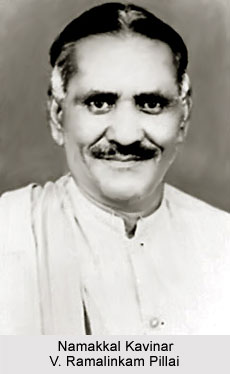 Namakkal Kavinar V. Ramalinkam Pillai or Namakkal Kavignar V. Ramalingam Pillai, also known as Venkatarama Ramalingam Pillai, was a well known poet and much respected Indian freedom fighter from Tamil Nadu. He has actively participated in the Indian freedom struggle and has greatly contributed to the development and progress of modern era in Tamil literature. He composed most of his verses in Tamil language about the independence of the nation. Some of his poems gained immense popularity amongst Indian freedom fighters. Namakkal Kavinar V. Ramalinkam Pillai composed hundreds of verses that comprised the enthusiasm and zeal of patriotism. He also actively participated in Salt Satyagraha movement against British rulers in the year 1930. Pillai was even imprisoned for one year. For his various contributions, Namakkal Kavinar was bestowed with the Padma Bhushan Award in the year 1971, from the Government of India.
Namakkal Kavinar V. Ramalinkam Pillai or Namakkal Kavignar V. Ramalingam Pillai, also known as Venkatarama Ramalingam Pillai, was a well known poet and much respected Indian freedom fighter from Tamil Nadu. He has actively participated in the Indian freedom struggle and has greatly contributed to the development and progress of modern era in Tamil literature. He composed most of his verses in Tamil language about the independence of the nation. Some of his poems gained immense popularity amongst Indian freedom fighters. Namakkal Kavinar V. Ramalinkam Pillai composed hundreds of verses that comprised the enthusiasm and zeal of patriotism. He also actively participated in Salt Satyagraha movement against British rulers in the year 1930. Pillai was even imprisoned for one year. For his various contributions, Namakkal Kavinar was bestowed with the Padma Bhushan Award in the year 1971, from the Government of India.
Early Life of V. Ramalinkam Pillai
Namakkal Kavinar V. Ramalinkam Pillai was born on 19th October, 1888 at Mohanur, in the district of Namakkal, Tamil Nadu. His father was employed as the Head constable at Mohanur and his mother was a religious and devout woman. V. Ramalinkam Pillai was the youngest child of his parents and had seven other elder siblings. He completed his studies from reputed schools in Namakkal and Coimbatore. Later he did his higher studies and successfully completed his BA from Bishop Heber College (Trichy), in the year 1909. In the beginning, Namakkal Kavinar V. Ramalinkam Pillai was employed as a clerk at the office of Namakkal Tahsildar. Later he worked as a primary school teacher as well.
Literary Works of V. Ramalinkam Pillai
Namakkal Kavinar V. Ramalinkam Pillai or Venkatarama Ramalingam Pillai composed several verses on various deities in shrines. Tamilan Itayam is one of the most popular poetical works of the renowned Tamil poet which consists of poems that glorify the Tamil people and infuse the feeling of friendship and amity among them as an ethnic group. Pillai wrote a remarkable epic entitled Avalum Avanum in an elegant yet simple style. Two other works, namely Tamil Ter and Cankoli comprised of several excellent verses on different themes. But with the poetical compositions of Kanti Ancali, the poet received immense fame and popularity. Namakkal Kavinar V. Ramalinkam Pillai also wrote many poems praising and eulogizing the greatness of Mahatma Gandhi. During the period of Salt Satyagraha, he composed a poem that requested the people of Tamil Nadu to join the movement. This got him even more respect from the general people. Pillai became popular as the Gandhian poet by propagating and by admiring the virtues of Gandhism.
Although the poems of Namakkal Kavinar V. Ramalinkam Pillai are devoid of force, impact and emotion, which are the critical features of a verse, but they mirror a refined calmness. The style and manner of composition is highly appropriate for extolling and eulogising the various ways of Mahatma Gandhi.
Namakkal Kavinar V. Ramalinkam Pillai was named as Asthana Kavignar or Poet Laureate by Madras Government in 1949, for his literary contributions. Moreover, in 1953 Pillai was nominated to the Sahitya Akademi and in 1956 and 1962 he was nominated as MLC by the Madras Government. In 1971, the Government of India awarded him the Padma Bhushan award.



















